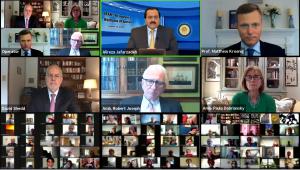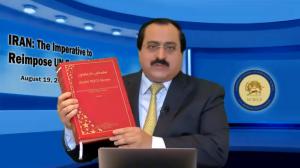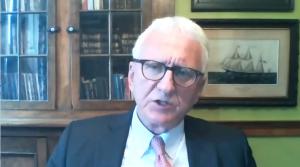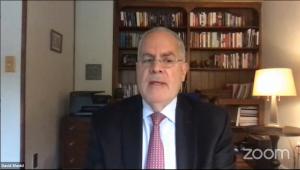Leading Experts Call for Reimposition of All UN Sanctions on Iran, Side with Iran’s People Seeking Change

On Wednesday, August 19, 2020, the U.S. Representative Office of the National Council of Resistance of Iran (NCRI-US) hosted a webinar, entitled “IRAN: The Imperative To Reimpose UN Sanctions,” with leading national security experts.

Alireza Jafarzadeh displays the book of victims fallen for freedom, which contains 20,000 names and particulars of those executed by the Iranian regime during the August 19, 202 webinar “IRAN: The Imperative To Reimpose UN Sanctions.”

Ambassador Paula Dobriansky, the former Undersecretary of State for Global Affairs, speaks at NCRI-US webinar “IRAN: The Imperative To Reimpose UN Sanctions,” August 19, 2020

Ambassador Robert Joseph, the former Undersecretary of State for Arms Control and International Security, speaks at NCRI-US webinar “IRAN: The Imperative To Reimpose UN Sanctions,” August 19, 2020.
NCRI-US policy webinar also focuses on the regime’s regional aggression, assassination of dissidents abroad, missile and nuclear programs, domestic crackdown
WASHINGTON, DC, UNITED STATES, August 21, 2020 /EINPresswire.com/ -- On Wednesday, August 19, 2020, the U.S. Representative Office of the National Council of Resistance of Iran (NCRI-US) hosted a panel of leading national security experts to discuss the necessity of reinstituting UN sanctions on the Iran regime. Entitled “IRAN: The Imperative To Reimpose UN Sanctions,” the panel focused on various aspects of the grave risks to regional and global peace and security if the United Nations arms embargo on the Iranian regime, due to expire in mid-October, is not extended. In that context, they discussed the strategic necessity of reimposing all UN sanctions on Tehran. The policy webinar also focused on the Iranian regime’s regional aggression, whether direct or through proxy militias, its terrorism, assassination of dissidents abroad, missile and nuclear programs and domestic crackdown on the Iranian people.
Former Undersecretary of State for Global Affairs, Ambassador Paula Dobriansky; former Undersecretary of State for Arms Control and International Security, Ambassador Robert Joseph; former Acting Director of the Defense Intelligence Agency, David Shedd; and Director of the Global Strategy Initiative at The Atlantic Council, Georgetown professor Matthew Kroenig, were the panelists. Deputy Director of the NCRI-US and author of The Iran Threat, Alireza Jafarzadeh, moderated the online event, viewed by several hundred observers from across the United States on ZOOM, as well as via livestream on the NCRI-US twitter account.
In his opening remarks, Alireza Jafarzadeh explained that “Iran has been facing the COVID-19 pandemic since February. More than 90,000 people have died in some 400 cities. Now, instead of allocating resources to saving the lives of the Iranian people when they need it the most, the Iranian regime over the past six months has provided at least 400 million dollars to Hezbollah in Lebanon. In contrast, it has allocated only 300 million dollars to fighting the pandemic for Iran's population of 85 million.” He added that “the mullahs pay their mercenaries in the region an average of $1,000 per month, while the highest paid nurses are paid only $200 per month.”
The panel’s first speaker, David Shedd, enumerated a long list of the regime’s malign actions. Pointing to “the priorities that the regime has in terms of exporting the revolution at the expense of the people of Iran,” he stressed, “As I’ve looked around the region and beyond in terms of Iranian activities, I’ve come away with three principles that I’ve observed. The first principle is, good behavior on the part of the international community has not been matched by the Iranian regime’s response in changing its behavior. I would argue that they have continued on the path of really challenging the international order regardless of what has been given to them in the negotiation of the JCPOA.
“The second principle is that the Iranian regime rules with a despotic hand when it comes to the interests of the Iranian people… [The third principle is that] it has made alliances of sorts with Russia, with the Chinese, and obviously with North Korea when it comes to their missile program, and other bad actors around the globe as well, at the expense of the United States’ interests and those of countries with democratic values.
“Ultimately, the sanctions that have been applied in the last three-plus years under the Trump administration are taking effect and are creating the pressure points that we need to see that change in behavior, because of those three principles’ not being observed in terms of the international community and the role that Iran should be playing as a responsible nation in the world.”
In his response to a question about the impact of the call by the Iranian Resistance to disband the Islamic Revolutionary Guard Corps (IRGC), the former Acting Director of the DIA said, “Having watched the IRGC and the Quds Force for over 30 years as an intelligence matter, I can assure the audience that the regime itself cannot survive without it. In the sense that it is the epitome on which the regime operates.”
Ambassador Dobriansky, discussing “the question of Iran in the geopolitical context,” explained, “In the context of our national security interest in the Middle East, Iran certainly figures prominently, and of course, the reason for that is there is unity of purpose in terms of Russia, China, and Iran and that it is engaging in malign activities that literally undermine, not only our national security interest, but also that of our allies and friends in and throughout the Middle East.”
Referring to regional efforts “in countering Iran’s hegemonic desires throughout the Middle East and its direct support for terrorists,” she stressed that “all of these countries view Iran as a direct threat, and rightly so. It’s worth noting that the UN Secretary General actually cited and stated how Iran was responsible for the missile attack on Saudi oil sites last year, and how it funds and supplies proxy forces like Hezbollah which have killed Americans in Iraq. Removing the arms embargo would give Iran an even more free hand to destabilize the region by exporting terror in support of its hegemonic interest, and clearly, this alignment is a crucial one, certainly in terms of our own policy calculation.”
The former Undersecretary of State for Global Affairs also analyzed the significance of the Iranian regime’s despicable human rights record and systemic crackdown on dissidents and protesters in formulating a sound and effective policy toward Tehran. “It underscores the need for moving forward with the maximum pressure campaign and also the deployment and the snapback of sanctions… Last November, we know that there were massive protests that took place in Iran, through all the provinces of Iran and over some hundred cities and towns. Here lethal force had been used to suppress and kill actually hundreds of innocent protestors, injuring thousands. The State Department has reported that there were some 1,500 who were killed in these protests… A second area is the area of executions. It’s very striking in this case, according to the U.S. State Department report, that as many as 60% of executions are kept secret.”
Responding to a question, Amb. Dobriansky underscored the role of social media in exposing the regime’s human right violations and bringing attention to the situation inside Iran, explaining “there is great interest because of this geostrategic competition that we see.” Describing the protests against human rights violations and the “scale and scope of corruption that has existed in the regime,” she emphasized, “what’s happening in Iran, to the people of Iran, is absolutely unacceptable and there has to be change. People are seeking change in Iran.”
The next speaker, Prof. Matthew Kroenig, explained that the administration has a clear strategy toward the rogue regime in Tehran, the maximum pressure strategy, and that it has succeeded in constraining Tehran’s resources, making it more difficult to fund its nuclear program, missile program, and destabilizing regional activities. “I was an opponent of the Iran nuclear deal. I thought it didn’t go far enough in addressing Iran’s enrichment capabilities and other things. But I do give the Obama administration credit. The snapback provision was quite clever. It’s essentially a kind of reverse Security Council veto. Normally, it’s the permanent members who have the ability to veto new measures, and in this case it was essentially reversed that the permanent members have to vote to extend sanctions relief against Iran and if any of them vetoed, then the sanctions immediately snap back, and so the United States is within its rights to snap back these sanctions. I think this was one of the cleverer aspects of the deal, and we shouldn’t let it go to waste.”
In response to a question concerning the fragility of the “autocratic regime” in Iran, Prof. Kroenig noted that such regimes “don’t have good processes for succession. They often are plagued with problems of internal crises of succession, political instability, regime collapse, civil war. So, just looking where this U.S. and Iran rivalry is going, I suspect that is a likely outcome [for the regime] and that at some point it will collapse. There will be some new regime in Iran. These are just the weaknesses of autocracies that we’ve seen throughout history, and I do think the regime now is under really unprecedented levels of pressure, if you look at the economic numbers, if you look at the protests.”
The last speaker, Ambassador Robert Joseph described how “the regime has taken billions of dollars that it gained from the agreement [JCPOA] and what hasn’t been siphoned off through corruption has been used to expand its support for terrorism, its aggression abroad, and the repression of its own people. But the central problem is not the JCPOA, as fundamentally flawed as it is. The problem is the regime, a regime that cannot reform or cannot become more moderate. It is a regime that will never abandon its support for terrorism or its use of terror as a tool to achieve its objectives.”
Ambassador Joseph added, “We must not throw the regime a lifeline by pursuing new fatally flawed agreements in exchange for more old false promises. We must deny the regime any legitimacy simply by telling the truth and keeping the focus on its reign of terror over the past 40 years. The recent House of Representatives resolution, with wide bipartisan support, is an important step, as are the growing calls to hold members of the regime responsible for their crimes against humanity. Iran’s leaders know that they have lost all legitimacy. The Iranian people have now become the greatest threat to the regime. The mass killings in the street across Iran are acts of a desperate and dying regime. Expressions of support for those in Iran seeking democracy, statements from our President, from the Secretary of State, and from others are important because they uphold human rights as a principle of U.S. policy, and they add to the pressure on the regime. Most importantly, we must support the democratic opposition outside and inside Iran. We know that regime change must come from within, and we know that regime change will come from within.”
Responding to a question about the prospects for change in Iran, Ambassador Joseph said, “What we see today in Iran is the struggle and the sacrifice of the people against a brutal dictatorship, a struggle that has cost tens of thousands of lives over the past 40 years. I believe that the end of this struggle is approaching. I can argue that it’s best seen in the desperate acts of a corrupt and repressive regime at war with its own people, and its own people are the first and foremost victims of the regime, a regime whose time has come.”
Addressing the role of the Iranian opposition, Ambassador Joseph said, “I think we need to prepare for the end of that regime. Here I would emphasize the importance of the NCRI in particular, whose platform calls for a secular, non-nuclear, and democratic Iran. Outside of Iran, NCRI has mobilized international opinion in Europe, in the United States, in Asia based on opposition to the regime, political opposition and moral opposition, to the regime. Inside Iran, the MEK has organized resistance units that have led the demonstrations that we’ve talked about in the panel discussion, last November, since then in January, and it’s the organized force, it’s the best means of providing for a peaceful transition to a free and democratic Iran. Iran is not Libya. The future of Iran is not as a failed state. All you need to ask yourself at the end of the day is, why does the regime consider and declare the MEK and the NCRI to be public enemy number one? Just ask yourself. I think considering the source, that’s a badge of honor.”
In closing the conference, Alireza Jafarzadeh displayed the book of victims fallen for freedom, which contains 20,000 names and particulars of those executed by the Iranian regime. He reminded everyone about the summer of 1988, when 30,000 political prisoners, mostly belonging to the MEK, were executed. None had been sentenced to death. Based on an order by then Supreme Leader Khomeini, they were slaughtered just because they wanted freedom.
He summed up by saying, “Over the past four decades, the regime in Iran has maintained its rule through sheer repression at home, the export of terrorism, development of nuclear weapons, creating chaos in the region, and its missile program.
“The termination of the six 2015 UN Security Council resolutions did not convince Tehran to abandon the nuclear weapons program, did not change the behavior of the Iranian regime internally or externally. All the concessions given as a result of the JCPOA further empowered the regime, and its terrorism has escalated in Europe. The lessons learned over the past four decades really taught us that the only effective approach is a firm policy, and decisiveness. Any kind of concessions will further embolden the Ayatollahs.
“As Ms. Rajavi, the President-elect of the National Council of Resistance of Iran, has said, and I quote, ‘This regime must not be allowed to acquire even a single bullet. It must not pocket profits from a single barrel of Iranian oil, and it must not spend even a single dollar from revenues that belong to the Iranian people for its survival.’
“We have been calling for the re-imposition of all of the six previous UN Security Council resolutions on the Iranian regime. Under no circumstances, no lifting of the arms embargo and no relief should be provided to the Iranian regime.
“Finally, to end the threat of the Iranian regime, there is only one solution, that is regime change by the people of Iran. Just think about it. What a difference it would make, not just for the region, but for the whole world, if Iran were free, if Iran were democratic, if Iran were to separate religion from state, respect the rights of its neighbors, and support peace in the Middle East. Not developing nuclear weapons, not building those missiles that are only used to create chaos and mayhem in the region, and not supporting terrorism. That is the kind of Iran that the people of Iran want. That is why they were chanting in the streets of Tehran and other cities: ‘Leave Syria alone; think about us,’ ‘“Neither Gaza, nor Lebanon, I give my life for Iran.’ They are saying, ‘The enemy is right here (meaning the mullahs); they lie when they say it is America.’“
_____________________________________________
These materials are being distributed by the National Council of Resistance of Iran-U.S. Representative Office. Additional information is on file with the Department of Justice, Washington, D.C.
NCRI-US
National Council of Resistance of Iran - US Rep. Office
+1 202-747-7847
email us here
Legal Disclaimer:
EIN Presswire provides this news content "as is" without warranty of any kind. We do not accept any responsibility or liability for the accuracy, content, images, videos, licenses, completeness, legality, or reliability of the information contained in this article. If you have any complaints or copyright issues related to this article, kindly contact the author above.


